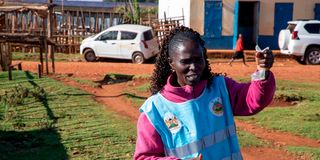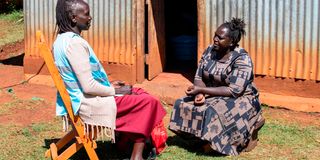How community dialogue is increasing demand for family planning products

Ms Alice Kibet, a Community Health Promoter, illustrates how to use a female condom at Bugar Market in Elgeyo Marakwet County.
What you need to know:
- Nearly 257 million women worldwide have unmet need for modern contraception, which increases their vulnerability to sexually transmitted infections such as HIV as well as unintended pregnancy, unsafe abortion and preventable maternal death.
It’s a hot afternoon and the fields of Bugar in Elgeyo Marakwet, usually abuzz with activity as farmers prepare for the approaching maize harvesting season, are quiet.
Instead of tending to their crops, a group of 30 residents, men and women, have gathered at Bugar market. They are listening to Alice Kibet, a Community Health Promoter (CHP) from Kapsaisi village in Keiyo North. Her voice is firm as the attentive audience hangs onto her words.
Today, the market is serving as a classroom.
Armed with a variety of family planning products, Ms Kibet takes time to explain to the residents why they need to plan their families.
“The cost of living remains a major challenge to most families and we thus need to give birth to a number of children who we can comfortably take care of, feed, clothe, take to school and even plan for their futures,” says Ms Kibet.
Body to heal
Planning for children, she says, also allows a woman's body to heal before conceiving again, while she also gets enough time to take care of the other children.
She adds that having children at planned intervals enables the woman to engage in income generating activities.
“As a family, both husband and wife should engage each other on the topic. It should not be a decision made by only the mother or father. If possible, accompany your spouse to the health facility when seeking family planning services,” explains Ms Kibet; with the locals shaking their heads in agreement.
Ranging from male and female condoms, coil, implant and Sayana Press, she explains how the different family planning products work and how they should be used.
Each of the products, she says, has advantages and disadvantages and should only be used as prescribed by a qualified health worker.
She goes on to educate the locals that except for condoms that can protect one from sexually transmitted infections and prevent pregnancy, all the other family planning methods can only be used to prevent pregnancy within a given period.
After the 30-minute session, Ms Kibet opens the floor for questions.

The locals ask whether the methods can affect their sex life or lead to barrenness, how to use a female condom and some of the side effects of the available options.
As the locals head back to their homes, Ms Kibet tells Healthy Nation that she has been a CHP since 2018 and that one of the major roles she currently plays in the village is creating awareness on the need to plan families.
She facilitates community dialogues often conducted in self-help groups, church gatherings, village barazas, youth meetings, during household visits and community-based organisation events.
“I have created a close relationship with the villagers, who are always kind enough to share with me their family planning details,” says Ms Kibet, who is identified by the locals as ‘daktari wa Kijiji’; loosely translated to village doctor.
She notes that planning a baraza involves a tedious task of visiting locals in their homes or work stations to share details of the planned meeting and why they need to attend. The session, often held once a month, attracts at least 30 members all eager to learn about family planning methods among other healthy habits, according to Ms Kibet.
“Apart from family planning, I also educate the locals about nutrition, general hygiene, maternal and child health, among others.”
Ms Kibet is among the 1,260 CHPs in Elgeyo Marakwet County entrusted with the role of educating the community about family planning.
County Reproductive Health Coordinator Jonathan Tanui says that before they embarked on using the CHPs as the community trainers, the job was solely entrusted to health workers.
“However, we eventually opted for CHPs because the community understands them better. The locals can easily earn their trust and dedicate time to pay attention to them,” says Mr Tanui, noting that the CHPs are appointed by the villagers.
In the nearby Tampoyo Village within Keiyo North, Ms Everlyne Kangongo, also a CHP, is busy conducting a door-to-door household visit.
She is welcomed in the home of Ms Lilian Jebet, a mother of two. Ms Kangongo is here to find out how Ms Jebet is doing after she recently inserted a five-year implant.
The CHP explains that at the household level, she educates families on the various birth control methods, with most of her clients being women.
“I write referral letters for the interested clients, who then visit the nearest health facility to seek the services,” she says, adding that CHPs are not allowed to administer or force locals to consume the commodities.
Ms Kangongo notes that in a single month, she visits all the 100 households in her community units, offering different lessons around health.
Just like her counterpart Ms Kibet, she also holds community dialogues at least once in a month.
“We include both men and women because we believe each of them has a role to play when it comes to planning a family,” she offers.
One of her happy moments at work, she explains, is when a resident who is consuming the commodities comes back to thank her; having seen the impacts of their decisions.
She adds that most of her clients are currently raising healthy children, thanks to their ability to plan pregnancies.
“We have partnered with Marie Stopes Kenya, who organise the CHP trainings before public education begins,” says Mr Tanui.
Through a financial and technical support from the United Nations Population Fund (UNFPA), Marie Stopes Kenya provides family planning services and trains healthcare workers in the county.
“We recently concluded the training on subcutaneous DMPA – an an all-in-one self-injectable contraceptive - and I am looking forward to checking the indicators,” says Mr Tanui.
According to the 2022 Kenya Demographic Health Survey, 74.3 per cent of married women aged between 15 to 45 years in Elgeyo Marakwet County are currently on contraceptives.
The survey further revealed that 59 per cent of the locals have currently embraced the use of modern contraceptives.
The reproductive health officer says in order to attain the required 60 per cent national target of modern contraceptive uptake in the county, there is need to increase staff mentorships on family planning and training on post-pregnancy intrauterine devices.
“We also need a constant supply of the birth control commodities to meet the increasing demand,” he says.
According to UNFPA , access to contraception is a human right. When satisfied, it furthers the health and well-being not just of women and girls but of their families and societies.
The UN sexual and reproductive health agency states that every individual must be guaranteed the freedom to protect their reproductive health and plan their family.
Access to contraception is essential to bodily autonomy and achieving one's full potential, helps reduce adolescent births, prevent maternal deaths and further gender equality, including through the socioeconomic empowerment of women and girls, as explained by UNFPA.
While marking the World Contraception Day today, the agency, however, has expressed concerns that nearly 257 million women worldwide have unmet need for modern contraception, which increases their vulnerability to sexually transmitted infections such as HIV as well as unintended pregnancy, unsafe abortion and preventable maternal death.
"We cannot allow women to die due to a lack of access to contraception. Instead, we must prioritise providing women and girls worldwide with what they need to stay safe and defend their sexual and reproductive health, even amid crisis and displacement," says the agency .




